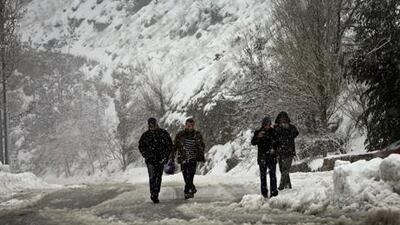AMMAN // Heavy rainfall, strong winds and snow lashed Jordan for a second day yesterday while other Middle East countries struggled with extreme weather.
The cold and wet weather hit Israel, where authorities were preparing for the possibility of snow in Jerusalem and, in Lebanon, where flood waters swept away a young boy.
Jordan, which is 92 per cent desert, is one of the driest countries in the world but authorities declared a state of emergency across the country in reponse to the rain.
Fhaid Tiameh, the assistant director at the centre for Jordan's Department of Metreology, said the country had not experienced that much rain in two decades.
"The rainfall in the past few days was the best we had had since the winter of 1991-1992," he said.
Rainfall in first forty days of winter, which starts on December 21, contributes to 30 per cent of the season.
"Already, the precipitation is more than 100 per cent and the season is not over yet."
The main road between Amman and the northern city of Zarqa was closed as sections were swamped by up to a metre of water and, in the capital, flash floods overwhelmed a drainage system and most traffic underpasses and tunnels were closed. The city council and water utility traded blame for the resulting traffic gridlock, while the government came in for criticism from the media.
The weather forecast predicted snow in hilly areas above 800 metres with temperatures expected to drop below zero last night.
Authorities announced the closure of major tunnels due to the increase of water levels. The Civil Defence Department urged citizens to ensure that their houses are properly ventilated to avoid suffocation from kerosene and gas heaters.
But the recent price hikes in oil and gas coupled with an end to government subsidies has left many Jordanians in a dire situation this winter.
"I live on 80 dinars (Dh415) a month from the social development," said Fadya Masarweh, a 54, Jordanian mother of four. "I have one kerosene heater but I don't have kerosene to keep us warm. We hardly have any food. Only God knows how we survive," she said.
The weather also affected about 50,000 Syrian refugees at the Zaatari refugee camp in northern Jordan.
"The rainfall soaked the belongings of some of the refugees and we had to relocate around 60 families to the prefabs," said Ali Bibi, liaison officer from the United Nations.
"We need the international donor community to take the humanitarian responsibility to support and assist the refugees."
Riots had broken out at the camp yesterday when several refugees attacked aid workers with sticks and stones to protest against their living conditions made worse by the harsh weather.
Flooding also hit Israel yesterday, forcing the closure of the main motorway to Tel Aviv while weather experts warned of the possibility of a snowstorm in Jerusalem.
"The stream at the centre of the Ayalon motorway overran its banks this morning, forcing the closure of the road in both directions," police spokesman Micky Rosenfeld said. "Police and municipal authorities are now preparing for possible disruptions in Jerusalem from the snow forecast for tomorrow."
Damage from the rains over the past two days include the flooding of a shopping centre in the city of Modi'in and disruptions in train services after water submerged the Herzlyia station. The storms have raised the level of the Sea of Galilee by about 22 centimetres, Israel Radio said. That's still more than two meters below its maximum level after several years of below-average rainfall.
A baby was swept away in a flash flood in Lebanon on Monday and he was still missing yesterday after a flash flood tore through a Bedouin encampment in the centre of the country, also taking with it tents, seven cows and more than 200 goats, the state NNA news agency reported. Two men were killed in traffic accidents as the torrential rainfall caused treacherous road conditions nationwide.
In the south, there were massive tailbacks after several rivers burst their banks cutting highways. In the Sidon area, police were reduced to patrolling by jet ski. A met office official at Beirut airport said the storm, which originated in Russia, would result in snowfall in the mountains as low as 300 metres.
The cold and wet weather in the region is expected to continue today and tomorrow.
foreign.desk@thenational.ae
* With additional reporting by Agence France-Presse and Bloomberg News

